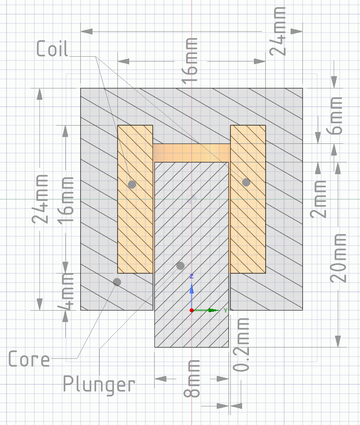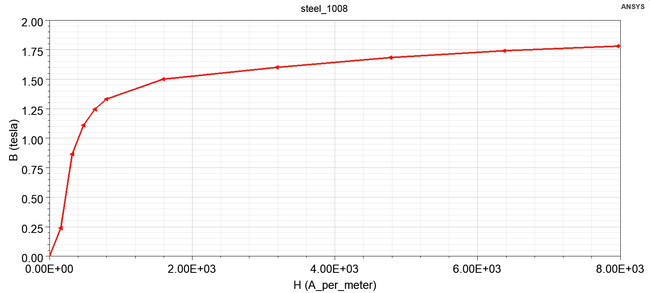Homework Assignment
|
Analysis of Solenoid Valve | ||
|
Instructor
|
Teaching Assistants:
| |
Aim of Assignment
Students will learn the basics of electromagnetic field calculations, their main steps, and gain practice in evaluating results and writing a Technical Report that meets international expectations.
Knowledge needed to solve the problem
- The main steps of the finite element method;
- Theoretical knowledge of the static magnetic field (for defining materials, for excitation);
- Knowledge of CAD system to create geometry;
- Download and install ANSYS AIM Student.
The Semester Assignment
The task consists of two parts, a basic task, with a faultless solution of up to 70%, and an extra task, with an additional maximum of 30%.
Deadline May 25, 2019, 12:00 Output Form: PDF format. Color drawings should be made so that their contents are clear to the reader in black and white. Language English Place of submission: marcsa@maxwell.sze.hu email address Late submission: After every day started, a 5% deduction from the achieved result (i.e. after 5 days delay 100% can only be obtained up to 100% - 5x5% = 75%). Evaluation: 0 - 48% - Insufficient [F] (1) 50 - 59% - Sufficient [D] (2) 60 - 70% Satisfactory [C] (3) 71 - 84% Good [B] (4) 85 - 100% - Very good [A] (5) For the formal requirements, the requirements of CFD and mechanics are also valid here.
Part I of the Assignment
Calculating the force on the solenoid valve by finite element method
The task is cylindrical to the vertical ([math]z[/math]) axis, and the three-dimensional geometry must be prepared according to the specified dimensions (see figure).
Tasks
- Define the problem type based on the given parameters;
- Creating and specifying the task geometry in ANSYS Discovery AIM;
- Run the FEM simulation;
- Validation of results for a 2mm air gap.
The results of the simulations. Software Discovery AIM Maxwell 3D FEMM Maxwell 2D Force [N] 3,586 3,582 3,542 3,587 Inductance [mH] 39,88 39,84 39,71 39,84
- Test of Solution Performance (Solution performance tuning, Curved surface meshing) as a function of force;
- Number of finite elements (Tetrahedra), Energy (Total Energy), Energy Error and Delta Energy in the function of adaptive steps in two different cases;
- Postprocessing [at least two of the below]:
- 1) determination of force and inductance;
- 2) displaying equipotential lines;
- 3) display the minimum and maximum of the magnetic flux density;
- 4) display the magnetic field strength;
- 5) displaying magnetic flux density vectors.
- Preparation of a Technical Report based on the use of the above results.
Note: The “Part I of the Assignment” elements will be reviewed in detail during the exercise to prepare and run a simulation model for an electromagnetic task. On this basis, students can easily complete Part I of the Assignment by attending the exercises.
Note: The core and the coil is in contact with each other. This is not a problem for a two-dimensional (cylindrical) case, but for the three-dimensional case, the current flows not only in the coil but also in the core. To overcome this problem, the Physics Definition - Electromagnetic Conditions - Insulating boundary condition must be applied to the coil in the ANSYS Discovery AIM software. In reality, the coil is surrounded by an insulator, which is typically not modeled in the task, instead of using a boundary condition.
- Parameters for this Assignment:
- Relative permeability of air and coil [math]\mu_r = 1[/math];
- The excitation of the coil (To validate the results): [math]I=0.76~\text{A}[/math], [math]N=789~\text{turns}[/math] (DC);
- Magnetic curve of the core and plunge:
Figure 1. - Steel 1008 steel magnetization curve. Part II of the Assignment
Determining the force acting on the moving part of the problem (plunger) and the inductance of the coil as a function of displacement.
Note: This task corresponds to the solenoid valve in internal combustion engines that controls the injection.
- Specific tasks
- Considering the plunger movement to the initial state (2mm air gap) from [math]-1.8\text{mm} \text{ to } 10\text{mm}[/math] (at least in 7 positions). Detailed instructions on the solution will not be available.
- This part is intended to measure the degree of autonomy, initiative and diligence of the student, i.e.:
- is the student able to do independent work;
- to design, assemble and run the simulation alone.
References

